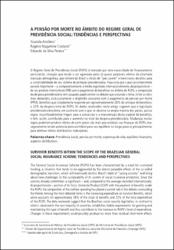Please use this identifier to cite or link to this item:
https://repositorio.ipea.gov.br/handle/11058/4179Full metadata record
| DC Field | Value | Language |
|---|---|---|
| dc.contributor.author | Ansiliero, Graziela | - |
| dc.contributor.author | Costanzi, Rogério Nagamine | - |
| dc.contributor.author | Pereira, Eduardo da Silva | - |
| dc.coverage.spatial | Brasil | pt_BR |
| dc.date.accessioned | 2015-08-17T18:17:18Z | - |
| dc.date.available | 2015-08-17T18:17:18Z | - |
| dc.date.issued | 2014-06 | - |
| dc.identifier.uri | http://repositorio.ipea.gov.br/handle/11058/4179 | - |
| dc.description.abstract | O Regime Geral de Previdência Social (RGPS) é marcado por uma necessidade de financiamento persistente, situação que tende a ser agravada pelos já quase palpáveis efeitos da chamada transição demográfica, que retirará do Brasil o rótulo de “país jovem” e trará novos desafios para a sustentabilidade de seu sistema de proteção previdenciária. Haja vista que o país já compromete parcela importante – e, comparativamente à média registrada internacionalmente, desproporcional –de seu produto interno bruto (PIB) com o pagamento de benefícios no âmbito do RGPS, a composição da despesa previdenciária tem ocupado papel central no debate que circunda o tema. Entre os itens mais debatidos, está justamente o dispêndio crescente com o pagamento de pensão por morte (PPM), benefício que isoladamente responde por aproximadamente 28% do estoque de benefícios e 22% da despesa total do RGPS. Os dados analisados neste artigo sugerem que a legislação previdenciária brasileira, em contraste com o que se observa na ampla maioria dos países, possui regras injustificadamente frágeis para a concessão e a manutenção desta espécie de benefício, e tem, assim, contribuído para o aumento no nível da despesa previdenciária. Mudanças nestas regras poderiam produzir efeitos de curto prazo não mais que residuais nas finanças do RGPS, mas seguramente teriam potencial para contribuir para seu equilíbrio no longo prazo e, principalmente, para eliminar efeitos distributivos indesejáveis. | pt_BR |
| dc.language.iso | pt-BR | pt_BR |
| dc.publisher | Instituto de Pesquisa Econômica Aplicada (Ipea) | pt_BR |
| dc.title | A Pensão por morte no âmbito do regime geral de previdência social : tendências e perspectivas | pt_BR |
| dc.title.alternative | Survivor benefits within the scope of the brazilian general social insurance scheme : tendencies and perspectives | pt_BR |
| dc.title.alternative | La Pensión de sobrevivientes en el marco del régimen general de previsión social : tendencias y perspectivas | pt_BR |
| dc.title.alternative | Les Prestations de survivant dans le cadre du regime general d’assurance sociale : tendances et perpectives | pt_BR |
| dc.type | Planejamento e Políticas Públicas (PPP) - Artigos | pt_BR |
| dc.rights.holder | Instituto de Pesquisa Econômica Aplicada (Ipea) | pt_BR |
| dc.source.urlsource | http://www.ipea.gov.br/ppp | pt_BR |
| dc.location.country | BR | pt_BR |
| dc.description.physical | p. 89-146, il. | pt_BR |
| dc.subject.vcipea | IPEA::Política Econômica. Política Social. Planejamento::Seguridade Social | pt_BR |
| dc.rights.license | É permitida a reprodução deste texto e dos dados nele contidos, desde que citada a fonte. Reproduções para fins comerciais são proibidas. | pt_BR |
| dc.subject.keyword | Previdência social | pt_BR |
| dc.subject.keyword | Pensão por morte | pt_BR |
| dc.subject.keyword | Esperança de vida | pt_BR |
| dc.subject.keyword | Equilíbrio financeiro | pt_BR |
| dc.relation.references | http://repositorio.ipea.gov.br/handle/11058/3626 | pt_BR |
| ipea.description.additionalinformation | Artigo publicado em: Planejamento e Políticas Públicas (PPP), Brasília, n. 42, 390 p., jan./jun. 2014. | pt_BR |
| ipea.description.additionalinformation | Possui referências bibliográficas | pt_BR |
| ipea.access.type | Acesso Aberto | pt_BR |
| ipea.rights.type | Licença Comum | pt_BR |
| ipea.englishdescription.abstract | The General Social Insurance Scheme (RGPS) has been characterized by a need for sustained funding, a situation that tends to be aggravated by the almost palpable effects of the so-called demographic transition, which will eventually dismiss Brazil’s label of “young country” and bring about new challenges to the sustainability of its system of social insurance protection. Since the country already committees a significant – and, compared to the average recorded internationally, disproportionate – portion of its Gross Domestic Product (GDP) with the payment of benefits under the RGPS, the composition of the welfare spending has played a central role in the debate surrounding the theme. Among the most debated items is the increasing expenditure on Survivor Benefits, which alone accounts for approximately 28% of the stock of benefits and 22% of the total expenditure of the RGPS. The data reviewed suggest that the Brazilian social security legislation, in contrast to what is observed in the vast majority of countries, establishes feeble requirements for granting and maintaining this type of benefit and thus contribute to the increase on RGPS’s level of expenditure. Changes in these requirements could possibly produce no more than residual short-term effects on RGPS, but would certainly have the potential to contribute to its long-run equilibrium, and most definitely to eliminate undesirable distributional effects. | pt_BR |
| ipea.researchfields | N/A | pt_BR |
| ipea.classification | Previdência. Previdência Social | pt_BR |
| Appears in Collections: | Previdência. Previdência Social: Artigos | |
Files in This Item:
| File | Description | Size | Format | |
|---|---|---|---|---|
| PPP n42 Pensao.pdf | 1.9 MB | Adobe PDF |  View/Open |
Items in DSpace are protected by copyright, with all rights reserved, unless otherwise indicated.

